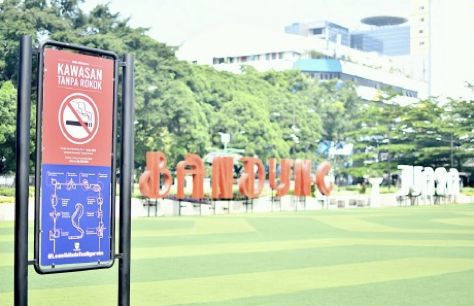In 2016, the city of Bandung in West Java, Indonesia, was facing a serious health threat: smoking rates in the province were some of the highest in the country. A survey that year found that 37% of Bandung residents between the ages of 16 and 49 smoked tobacco, with 41% of those individuals having smoked for more than 10 years. Furthermore, 90% of Bandung smokers were identified as belonging to a “smoking habit group” where smoking was primarily a social activity, an indication that smoking had a disturbingly high level of social acceptability.
Although Indonesia has a national tobacco control law, in order for it to be effective, there is significant pressure for local leaders to tailor and enforce tobacco control policy and initiatives within their cities. This created an opportunity for action – and Bandung rose to the challenge.
In 2017, Bandung issued a decree to create smoke-free spaces in several areas of the city, including all government buildings, hotels, restaurants and educational facilities. The Bandung Health Department coordinated enforcement efforts, which included smoke-free policy awareness workshops for stakeholders affected by the new regulations, and monthly enforcement inspections. The city created signage in the new smoke-free areas to inform people about the new regulation. A Smoke Free Area Task Force was formed in 2019 to further socialize, enforce and implement the smoke-free decree in Bandung.
The COVID-19 pandemic created a window of opportunity for Bandung to further advance its smoke-free efforts, given that tobacco use was identified as a key risk factor for severe outcomes from COVID-19. On May 17, 2021, the city passed another law strengthening the 2017 decree, and designated eight new types of smoke-free areas, including places of worship and children's playgrounds. This was considered a major policy win and was a significant achievement for the city after many years of advocating for stronger smoke-free regulation. Mayor Oded Muhammad Danial unveiled the new law to the public on World No Tobacco Day, May 31. Officials plastered smoke-free stickers on tourist buses, and participants wore face masks bearing the slogan #LeuwihHadeTeuNgaroko (“better to not smoke” in Sundanese). The city will take the next few months to familiarize the public with the law and prepare for compliance measures. It plans to begin strict smoke-free enforcement activities in 2022.
Compliance was a challenge under the 2017 decree; baseline survey results from February 2019 showed that approximately 81% of smoke-free areas were in violation. Bandung developed a mobile app, ODK Collect, as a tool to improve the enforcement activities for the 2021 law. The mobile app will allow urban residents to help the city identify areas where smoking is happening illegally and to register compliance in different public areas. The city developed the app with support from the Partnership for Healthy Cities, using open-source software. Through a peer-to-peer exchange facilitated by the Partnership, the city of Rio de Janeiro learned more about Bandung’s ODK app; the experience will feed into improvements to Rio de Janeiro’s own mobile app used to enforce bans on tobacco advertising, promotion and sponsorship. The two cities plan to connect again on lessons learned, as well as technical aspects of the app’s development.
As the capital of West Java, and the fifth largest metropolis in Indonesia, a smoke-free Bandung will set a significant example across the region. The new law will protect thousands of lives and has created a strong precedent for other cities to follow.

Photo credit: Photo credit: City of Bandung/Vital Strategies

